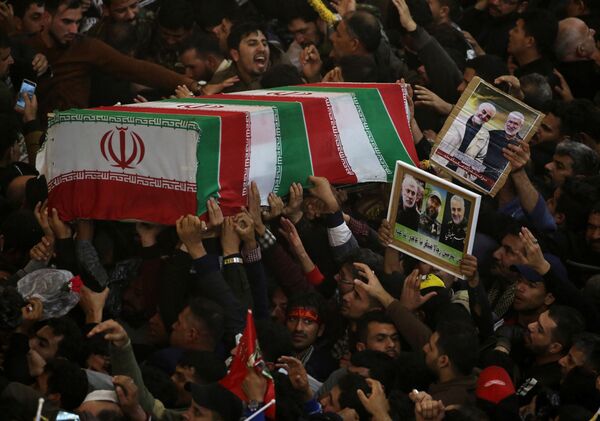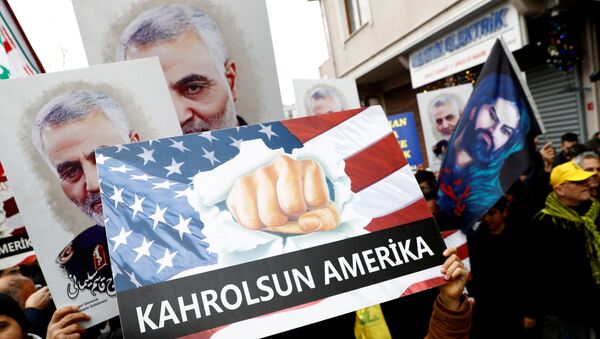Iran's foreign minister Javad Zarif has said that by ordering the assassination of Iranian General Qasem Soleimani, the "rogue regime" in Washington has unleashed worldwide fury against the US.
"What the US has accomplished in its terrorist assassination of (these) anti-ISIS [Daesh] heroes is to unleash global anti-US fury and a worldwide rancor—on a scale not seen in recent memory. End of malign US presence in West Asia has begun," Zarif tweeted on Monday, 6 January.
What the US has accomplished in its terrorist assassination of anti-ISIS heroes is to unleash global anti-US fury and a worldwide rancor—on a scale not seen in recent memory.
— Javad Zarif (@JZarif) January 6, 2020
End of malign U.S. presence in West Asia has begun. pic.twitter.com/Hl1p0LttX2
Zarif's tweet was accompanied by photos of anti-US protest rallies sweeping several countries in the region, as people in Pakistan's Karachi and India's Kashmir took to the streets to condemn Washington’s assassination of General Soleimani.
Anti-US slogans dominated demonstrations as hundreds of people in the Muslim-majority region of Kashmir turned out to protest against Friday's assassination.
Angry protesters in Karachi gathered near the US consulate to express their anger over the murder on Monday.
The Iranian foreign minister also gave a response to the recent threats by Donald Trump to use force against the Islamic Republic and bomb its cultural sites, as he tweeted on Monday night that the Iranian nation's huge turnout at General Soleimani's funeral ceremonies ought to give the US President pause.
.@realDonaldTrump threatens Iran with violations of intl law— even war crimes such as use of force, “disproportionate response” & bombing cultural sites.
— Javad Zarif (@JZarif) January 6, 2020
Iranian people responded today. Does he still hope to frighten them?
Or realize he’s turned the U.S. into a #RogueRegime? pic.twitter.com/ZezR0vGiF0
Current tweets from Iranian Foreign Minister Mohammad Javad Zarif came as reports claimed he was being denied a US visa he requested earlier to enter the United States.
Zarif had planned to come to New York to address the UN Security Council on 9 January on the killing of Iranian top commander Qasem Soleimani.
A Washington-based diplomatic source told Foreign Policy that a Trump administration official phoned UN Secretary-General Antonio Guterres on Monday to tell him that the United States would not allow Zarif into the country.
Earlier, a diplomatic source said that Iran’s mission to the United Nations had not received any official communication regarding the state of Zarif’s visa to enter the United States.
Calls for Revenge
On Monday, 6 January, millions of Iranians packed the streets of Tehran to pay homage to General Soleimani, as a sea of mourners descended on the iconic Enqelab Square.
People were carrying portraits of their national hero and reportedly chanted "Death to America" and "Death to Israel," amid vociferous calls for revenge. The funeral held in Tehran came after similar processions in the Iraqi cities of Najaf, Karbala, and Kadhimiya and also the Iranian cities of Ahvaz and Mashhad.
After Tehran, the coffin was taken to the holy city of Qom before reaching its final destination, General Soleimani's hometown Kerman, where the body is to be laid to rest.

The drone strike that killed Soleimani was the culmination of a succession of incidents which began on 27 December, when a US military base in Kirkuk, Iraq was hit by rockets launched by unidentified forces, killing a US civilian contractor and injuring several US troops.
Washington accused Kata’ib Hezbollah, an Iraqi Shia paramilitary group supported by Iran, of involvement, and in a retaliatory move, attacked five of the militia’s positions across Iraq and Syria on 29 December, killing 25 fighters.
The US actions generated a violent response as protesters attacked and tried to storm the US Embassy in Baghdad on New Year’s Eve.
In the early hours of Friday, 3 January, Iranian General Qasem Soleimani, the commander of the Islamic Revolutionary Guard Corps’ elite Quds Force, was killed by a US drone attack near Baghdad International Airport. Kata’ib Hezbollah leader Abu Mahdi al-Muhandis was riding in the same convoy as Soleimani and was also killed in the attack, along with another 10 people.
US President Donald Trump insisted Washington had authorised the strike as preemptive action against Soleimani to “stop a war”, claiming the top Iranian commander had been “plotting imminent and sinister attacks on American diplomats and military personnel”.
Shortly after the raid, Iran pledged to retaliate, with Iran’s Supreme leader Ali Khamenei tweeting:
“Harsh vengeance awaits the criminals that got his [Soleimani] and other martyrs’ blood on their evil hands in last night’s incident.”
On Saturday, 4 January, Kata’ib Hezbollah, Iraqi Shia militias within the Iran-backed Popular Mobilisation Forces, threatened to launch attacks on military bases used by US forces in Iraq.
In response, US President Donald Trump tweeted that the United States had “targeted 52 Iranian sites”, as he warned Tehran against attacking “any Americans or American assets” on Saturday night
* Daesh (also known as ISIL/ISIS/IS/Islamic State) a terrorist organisation banned in Russia and many other countries




